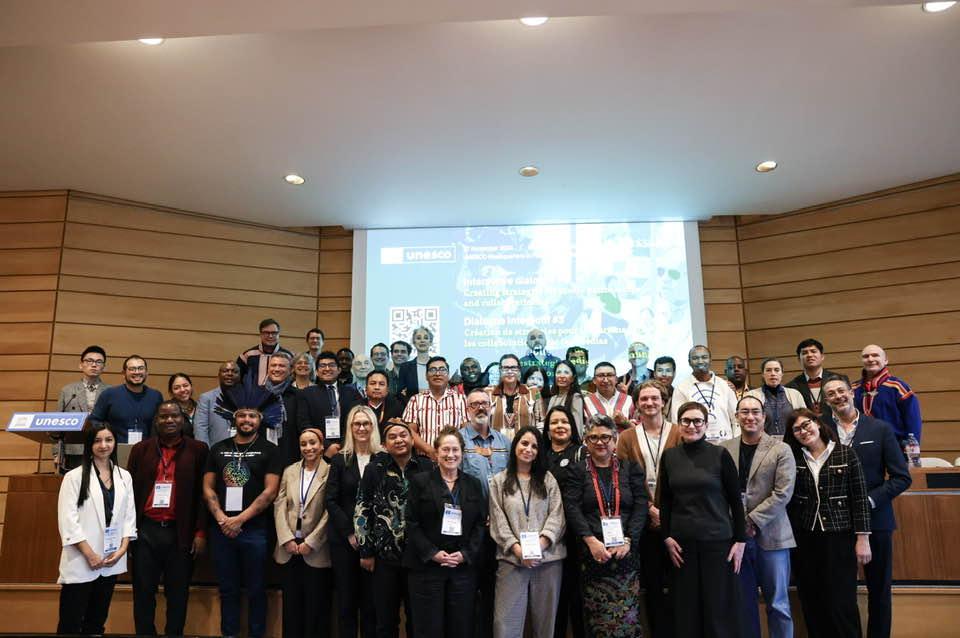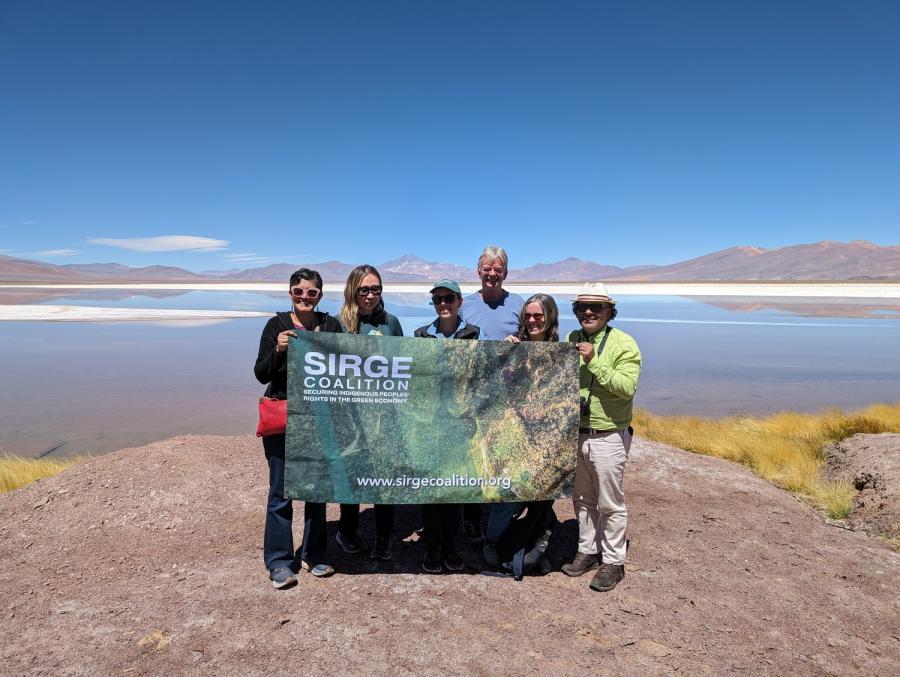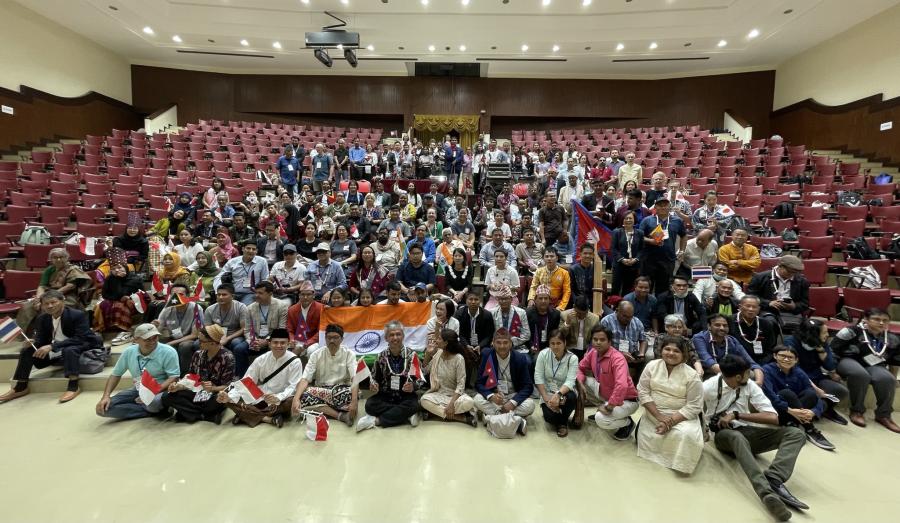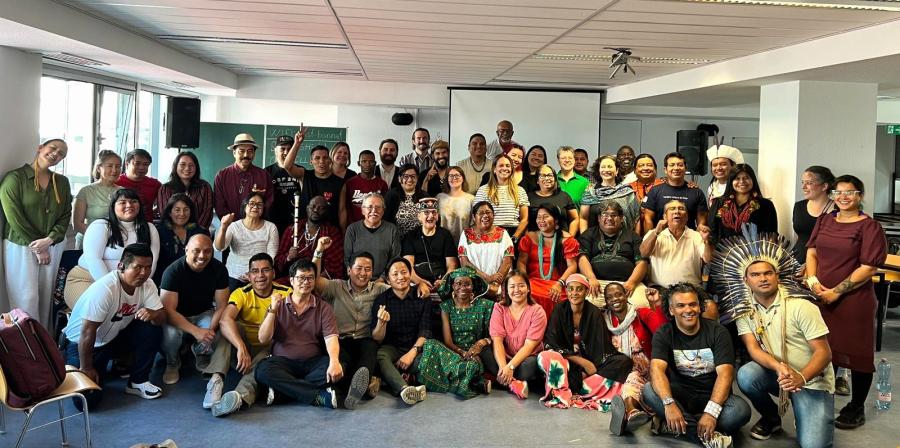
By Dev Kumar Sunuwar (Koĩts-Sunuwar, CS Staff)
In a resounding affirmation of Indigenous media’s vital role in fostering inclusivity and diversity, UNESCO recently convened a landmark two-day event, Expert Meeting and Media Partnership Forum on Indigenous Peoples and the Media, at its headquarters in Paris on November 26-27, 2024. This gathering brought together a diverse and influential group of 44 Indigenous media experts from 29 countries, including representatives from United Nations Indigenous Mechanisms, Indigenous-led and mainstream media professionals, media regulators, academics, and civil society organizations.
The forum served as a crucial platform to address the challenges and opportunities facing Indigenous media worldwide. It focused on developing concrete proposals and strategies to advance the implementation of Article 16 of the UN Declaration on the Rights of Indigenous Peoples (UNDRIP). This article recognizes the fundamental right of Indigenous Peoples to establish and operate their own media in their languages and access all forms of non-Indigenous media without discrimination. It also calls on states to ensure that private and state media reflect Indigenous cultural and linguistic diversity.
Despite this recognition, many Indigenous Peoples continue to face barriers to accessing media, including limited representation in mainstream media and inadequate support for Indigenous-owned media. Mirta Lourenco, the Chief of UNESCO's Section of Media Development and Media in Emergency, emphasized the importance of a global study in addressing these issues. She said, "The global study is a significant step towards UNESCO's efforts to promote media pluralism and diversity to spark action and generate concrete solutions to empower Indigenous media and ensure its vital contribution to a more just and equitable world."

The forum, dedicated to strengthening Indigenous media, featured four interactive dialogues on key topics such as enhancing Indigenous representation in the media industry, amplifying Indigenous voices through free and independent media, fostering partnerships and collaborations, and developing actionable recommendations. This event brought together Indigenous media experts, UN representatives, and media professionals to discuss strategies for empowering Indigenous media and promoting its vital role in fostering inclusivity and diversity. The forum also showcased examples and case studies focused on promoting free and independent Indigenous media, highlighting professional standards, financial sustainability, and economic viability. These presentations provided valuable insights and practical guidance for Indigenous media organizations seeking to thrive in a rapidly evolving media landscape.
The forum was part of a series of consultations organized by UNESCO for its ongoing global study on Indigenous Peoples and media. This comprehensive study aims to analyze existing research, identify critical issues, and provide a thorough overview of Indigenous media landscapes worldwide. It highlights the importance of Indigenous media in empowering communities and combating stereotypes while examining policy approaches and training opportunities for Indigenous journalists.
Irmgarda Kasinskaite-Buddeberg, UNESCO Advisor for Communication and Information, underlined the importance of a global study on Indigenous Peoples and the Media as a vital step toward inclusivity. "UNESCO is leading this initiative through a rigorous process that includes an extensive literature review, an international survey, and comprehensive media monitoring," she explained. "We aim to identify critical gaps and opportunities to enable a more plural and diverse media landscape."
Kasinskaite-Buddeberg further emphasized the transformative potential of partnerships between Indigenous and non-Indigenous media. "These collaborations expand reach by engaging underrepresented audiences and promote sharing resources, expertise, and technology, leading to more diverse and impactful content. By supporting fair regulatory frameworks and leveraging digital and AI-driven solutions, we aim to amplify Indigenous voices, ensure equitable media operations, and strengthen the role of media in representing and serving Indigenous communities worldwide."

The study aims to analyze existing research, identify critical issues, and comprehensively overview the Indigenous media landscapes worldwide. It will highlight the importance of Indigenous media in empowering communities and combating stereotypes while examining policy approaches, challenges, and opportunities for Indigenous media and practitioners.
The study's origins date back to 2023 when the UN Permanent Forum on Indigenous Issues (UNPFII) highlighted the urgent need to examine national policies, practices, and funding programs regarding Indigenous media. In partnership with other UN entities and Indigenous Peoples, UNESCO was mandated to present the study's findings at the twenty-fourth session of the UNPFII, from 24 April to 2 May 2025. The study hopes to catalyze change, raise awareness, and prompt governments and other stakeholders to take concrete action to strengthen Indigenous media worldwide.
This comprehensive study represents a significant step towards empowering Indigenous voices and fostering a more inclusive and representative media landscape. It will ensure that Indigenous communities have the tools and resources to share their stories, preserve their cultures, and participate fully in the global conversation.
“UNESCO has undertaken a multifaceted approach. It has established a working group and engaged in consultations throughout 2023 and 2024, coupled with a comprehensive review, which led to the development of a media monitoring tool and a global survey covering Indigenous-led and non-Indigenous media. These are paving the way for actionable recommendations,” said Tawfik Jelassi, Assistant Director-General for Communication and Information at UNESCO.

To gather essential data, a global survey was launched targeting Indigenous-led media and mainstream media organizations, including public service and community media. The survey, covering over 70 countries, aims to provide insights into Indigenous media's opportunities and challenges in accessing information, expressing their views, and establishing and managing their own media platforms.
Another key component of the study was examining the intersection of media and Indigenous Peoples. For this, desk research conducted with Griffith University in Australia analyzed nearly 400 sources, revealing a critical need for more data on Indigenous media and its impact. This gap hinders the development of evidence-based media policies that benefit Indigenous communities.
"We found that for Indigenous-led media or Indigenous-owned media, there are very different approaches around the world to policies that support Indigenous media, to funding arrangements, and to ways in which Indigenous journalists and producers are supported and trained," said Susan Forde, a lead researcher of the desk research and Professor of Media and Journalism at the School of Humanities, Languages, and Social Science, Griffith Center for Social and Cultural Research, Griffith University. She added, “Indigenous media plays a crucial role in providing a platform for Indigenous voices and countering stereotypes.”
According to Forde, the study also revealed a lack of previous research on Indigenous media at an international scale, emphasizing the need for data to demonstrate the sector's significance and advocate for the human rights of Indigenous Peoples.
In addition to the survey and desk research, UNESCO conducted a media monitoring analysis to track global media coverage of Indigenous issues. This analysis has identified trends in geographical, thematic, and linguistic coverage, highlighted areas for improvement, and provided valuable data for developing effective media monitoring tools. Similarly, case studies were compiled based on interviews with Indigenous media professionals. These case studies showcase good practices and provide insights into successful initiatives. They will serve as valuable resources for policymakers and media organizations seeking to support and strengthen Indigenous media.
Indigenous media leaders, regulators, and public broadcasters participated in the forum. They emphasized the need for legislative recognition, capacity building, and increased access to digital tools for Indigenous media. They also addressed challenges such as inconsistent governmental recognition, funding gaps, and restrictive regulations, calling for greater support and protection for Indigenous journalists. Participants stressed the importance of governments legally recognizing and financially supporting Indigenous media as part of their duties under the UNDRIP.
The forum concluded by recognizing Indigenous media's vital role in advancing Indigenous cultures and rights and a call for coordinated action to address this growing sector's challenges and opportunities. Sheryl Lightfoot (Anishinaabe), a member of the UN Expert Mechanism on the Rights of Indigenous Peoples (EMRIP), highlighted the study's potential to drive change by identifying gaps and challenges in implementing Article 16 and providing recommendations to governments and stakeholders. She emphasized the need for greater support networks and global awareness of localized issues Indigenous media face. "The study seeks to improve the rights situation for Indigenous Peoples globally and ensure greater recognition and resourcing for Indigenous media, including legal status and financial support, as obligations of states under the UNDRIP." This comprehensive study represents a significant step towards empowering Indigenous voices and fostering a more inclusive and representative media landscape, ensuring Indigenous communities have the tools and resources to share their stories, preserve their cultures, and participate fully in the global conversation.
Dev Kumar Sunuwar was one of the attendees at the Expert Meeting and Media Partnership Forum on Indigenous Peoples and the Media.



